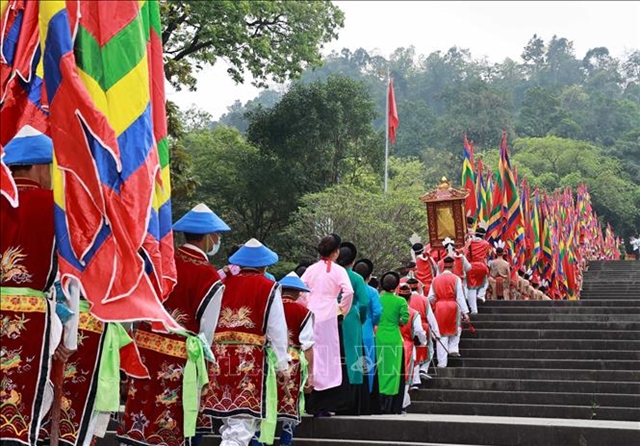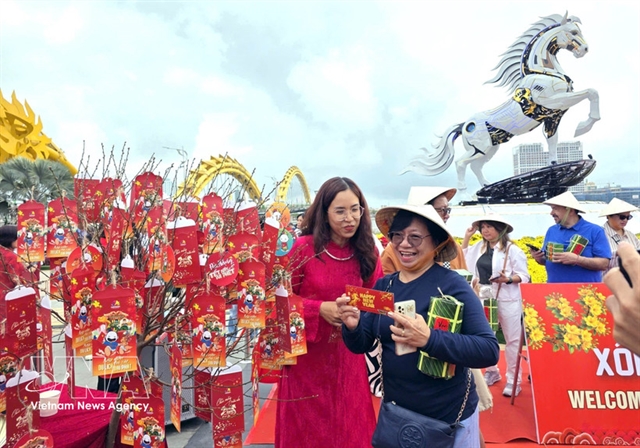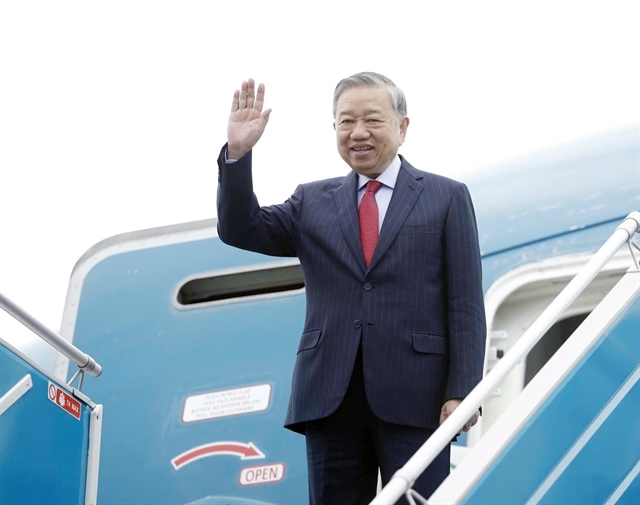 Politics & Law
Politics & Law

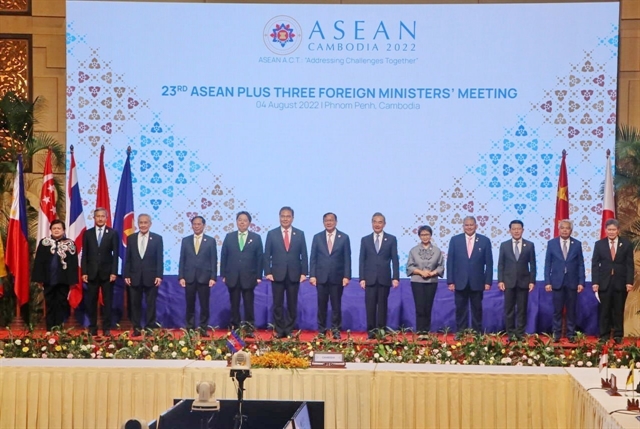
|
| The ASEAN Plus Three Foreign Ministers' Meeting (with China, South Korea, and Japan) was held in Phnom Penh on Thursday. — VNA/VNS Photo |
HÀ NỘI The foreign ministers of Việt Nam and other ASEAN countries reiterated their stance on maintaining the South China Sea as a sea of peace and cooperation on Thursday in Phnom Penh, Cambodia.
This is the consensus reached by the regional diplomats at the ongoing ASEAN Foreign Ministers’ Meeting and related meetings between ASEAN and its partners.
To this end, ASEAN calls for restraint from all parties to not complicate the situation in the South China Sea and urges efforts to handle disputes in line with international laws and the United Nations Convention on the Law of the Seas (UNCLOS) 1982.
Regarding the concerns of country partners about the situation in Myanmar, ASEAN countries said that there have been in-depth discussions on this issue.
The countries declared they will continue to engage with Myanmar in the spirit of ASEAN, and make efforts to implement the ASEAN leaders' Five-Point Consensus toward working with Myanmar to arrive at solutions to the current crises.
In the ASEAN+1 and ASEAN+3 meetings, orientations were set out to promote cooperation through the central role that ASEAN plays in regional relationships.
ASEAN and its partners agree that dialogue and cooperation for peace, stability, sustainable development and prosperity are the focus of the relationships.
Accordingly, the parties agreed to amplify cooperation towards a comprehensive and sustainable recovery post-COVID-19 pandemic. ASEAN expects its Northeast Asian partners to cooperate extensively in areas such as public health, digital transformation, innovative technology, smart infrastructure, human resource quality, and green and sustainable development.
The countries wish to strengthen cooperation in other areas, such as climate change response, environmental protection, biodiversity conservation, and the sustainable use of oceans and marine resources.
Discussing the international and regional situation, the parties expressed concern about the ongoing complexities and tensions in the region.
All countries believe that it is necessary to exercise utmost restraint and avoid actions that may complicate the situation and adversely affect the peace and stability of the region.
ASEAN countries also affirmed their support for the "One China" policy, stressing the importance of adherence to the principles of the United Nations Charter and the Treaty of Amity and Cooperation in Southeast Asia (TAC).
In addition, ASEAN also emphasised the importance of dialogue in handling the nuclear issue on the Korean Peninsula, especially in the context of the recent ballistic missile tests in this area.
ASEAN believes that complete, verifiable and irreversible denuclearisation of the Korean Peninsula should be based on self-restraint, mutual respect and, above all, the strict and full implementation of relevant resolutions of the United Nations (UN) Security Council.
Other countries also mentioned the issue of Japanese citizens being kidnapped in this area.
Minister Bùi Thanh Sơn emphasised the importance of frank, sincere dialogue and quality-oriented cooperation in regional collaboration mechanisms.
The Vietnamese diplomat said that ASEAN mechanisms are working and make effective contributions to enhancing regional trust and cooperation.
Minister Sơn stated that besides economic and trade priorities, countries need to uphold their responsibilities and participate in the furthering of integration and connectivity processes in the region, especially in narrowing the development gaps and promoting sub-regional cooperation.
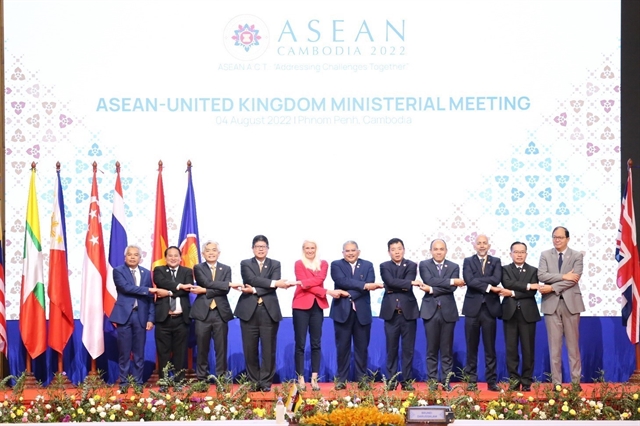
|
| Foreign ministers of ASEAN and Amanda Milling, Minister for Asia at the United Kingdom's Foreign, Commonwealth & Development Office, took a commemorative photo at the ASEAN-UK Ministerial Meeting on Thursday. — VNA/VNS Photo |
ASEAN foreign ministers also on Thursday had a meeting with Amanda Milling, Minister for Asia from the United Kingdom's Foreign, Commonwealth & Development Office.
The two sides pledged to work together to fully implement the newly established ASEAN-UK dialogue relationship.
The ministers approved the ASEAN-UK Plan of Action 2022-2027, focusing on trade, investment, renewable energy, innovation, climate change, and sustainable development.
ASEAN highly appreciates the UK's donation of GBP1 million to the ASEAN COVID-19 fund, and a commitment of GBP4.8 million to boost the region’s disease response.
ASEAN asked the UK to support the implementation of sustainable development goals, education, human resource development, and scholarships for students from ASEAN countries. — VNS
Bilateral meeting with Japan
Vietnamese Minister of Foreign Affairs Bùi Thanh Sơn on Thursday held a meeting with his Japanese counterpart Yoshimasa Hayashi on the side of the ongoing ASEAN Foreign Ministers' Meeting. The Japanese diplomat expressed his appreciation for the affection that the Vietnamese leaders and people, as well as Minister Sơn personally, have shown towards the late Prime Minister Abe Shinzo and the country of Japan. The two ministers were pleased to see that Việt Nam-Japan relations have developed in all fields, as seen by recent high-level contacts, which have made an important contribution to strengthening trust between the two countries. The two ministers agreed to enhance the exchange of information and experiences on issues of mutual concern, including the maintenance of peace, stability and cooperation in the region. Towards the celebration of the 50th anniversary of the establishment of diplomatic relations, the two ministers agreed to arrange visits by senior leaders, enhance coordination and improve the effectiveness of dialogue mechanisms. This could include the 12th meeting of the Việt Nam-Japan Cooperation Committee, the implementation of ODA programme for Việt Nam, and strengthening coordination stances within the framework of the United Nations, ASEAN, Mekong region, etc. This contributes to the maintenance of peace, stability and prosperous and sustainable development of the region. |

.jpg)
